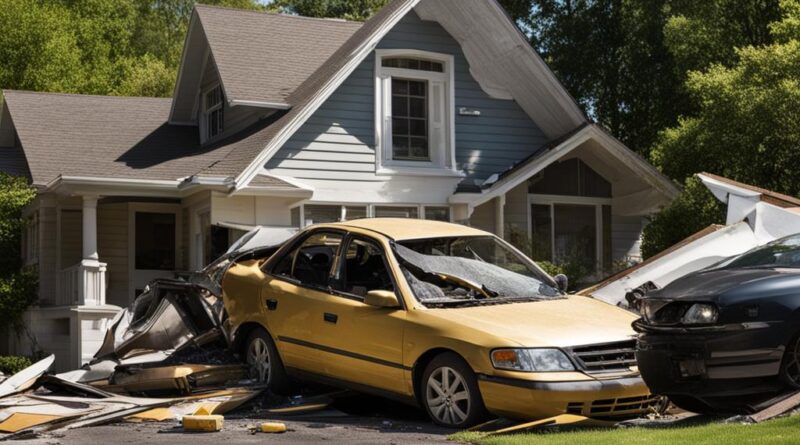At-Fault Car Accident Risk: Can I Lose My House?
Being involved in a car accident can have serious consequences, both in terms of personal injury and property damage. If you are at fault for the accident, one question that may arise is whether you could potentially lose your house.
When it comes to car accidents and home ownership, the risk of losing your house is not immediate or automatic. However, under certain circumstances, it is possible for a car accident lawsuit to result in property loss if you are sued for damages, found at fault for the accident, and the damages exceed the value of your home.
In this article, we will explore the potential risks associated with at-fault car accidents and home ownership, as well as steps you can take to safeguard your assets. It is important to note that the information provided is not legal advice, and consulting with a car accident attorney is crucial for personalized guidance and assistance.
Key Takeaways:
- If you are sued for damages resulting from an at-fault car accident and the damages exceed the value of your home, there is a risk of losing your house.
- Liability coverage provided by your auto insurance can help cover the costs of the other party’s injuries and property damage if you are at fault in an accident.
- To protect your assets, including your home, it’s important to ensure that your liability coverage matches your net worth and consider additional protection through umbrella policies.
- Some states, such as California, have homestead laws that offer limited protection to a portion of your home equity from creditors.
- Consulting with a car accident attorney is crucial in understanding your rights, navigating insurance claims, and minimizing financial risks.
Understanding Liability Coverage and Damages
When it comes to car accidents, understanding liability coverage and financial responsibility for property damage is crucial. Liability insurance is designed to protect you in case you are at fault in an accident and covers the costs associated with the other party’s injuries and property damage. However, it’s important to note that liability coverage has its limits.
Liability coverage typically includes two components: bodily injury liability and property damage liability. Bodily injury liability covers the medical expenses and other costs related to the injuries suffered by the other party, while property damage liability covers the repair or replacement costs for the other party’s property that was damaged in the accident.
However, liability insurance has its limits, and if the damages from the accident exceed your coverage amount, you may be personally liable for the remaining expenses. This means that you could be responsible for paying for the additional costs out of pocket, which could have a significant impact on your financial well-being. It’s crucial to carefully review and understand the limits of your liability coverage to ensure you are adequately protected.
“Liability insurance covers the costs of the other party’s injuries and property damage if you are at fault in an accident.”
The Importance of Adequate Coverage
Having sufficient liability coverage is essential to protect yourself from potential financial risks. If the damages from an accident exceed your coverage and you are held personally liable for the remaining expenses, you could face severe financial consequences, including potential lawsuits, wage garnishment, and even the loss of your assets, including your home.
It’s recommended that you assess your net worth and consider purchasing additional liability coverage, such as an umbrella policy, to provide extra protection. An umbrella policy can provide coverage beyond the limits of your primary liability insurance and offer valuable peace of mind.
Liability Coverage Limits
| Liability Coverage | Minimum Coverage Required by Law | Recommended Coverage for Adequate Protection |
|---|---|---|
| Bodily Injury Liability (per person) | $25,000 | $100,000 or higher |
| Bodily Injury Liability (per accident) | $50,000 | $300,000 or higher |
| Property Damage Liability | $10,000 | $100,000 or higher |
Keep in mind that these are general recommendations, and the appropriate coverage levels may vary depending on several factors, including your financial situation, assets, and the potential risks involved. Consulting with an insurance agent can help you determine the right coverage amounts for your specific needs.
Understanding liability coverage and the financial responsibility for property damage in car accidents is essential to protect yourself and your assets. By ensuring you have adequate coverage and considering additional protection, you can mitigate the potential risks and have peace of mind on the road.
Safeguarding Your Assets after an At-Fault Car Accident
Protecting your assets, including your home, is crucial in the aftermath of an at-fault car accident. To mitigate potential financial losses and secure your property, consider implementing the following strategies:
1. Review and Adjust Liability Coverage
Start by evaluating your current liability coverage to ensure it aligns with your net worth. In the event of an accident where you are at fault, insufficient coverage could leave you personally liable for damages exceeding your policy limits. By adjusting your liability coverage appropriately, you can protect your assets, including your home, from potential property loss.
2. Explore Umbrella Insurance
Consider purchasing an umbrella insurance policy for additional protection beyond your primary auto insurance coverage. Umbrella insurance provides an extra layer of liability coverage that extends beyond the limits of your existing policies. This additional coverage can safeguard your assets in case of a severe accident where the damages surpass the liability limits of your auto insurance policy.
3. Familiarize Yourself with Homestead Laws
Research the homestead laws in your state, as they can provide legal protection for a portion of your home equity. These laws vary by state, but they generally shield a specific amount of equity from creditors in the event of a lawsuit. By understanding your state’s homestead laws, you can gain insights into how much of your home’s value may be protected and take appropriate action to safeguard your property.
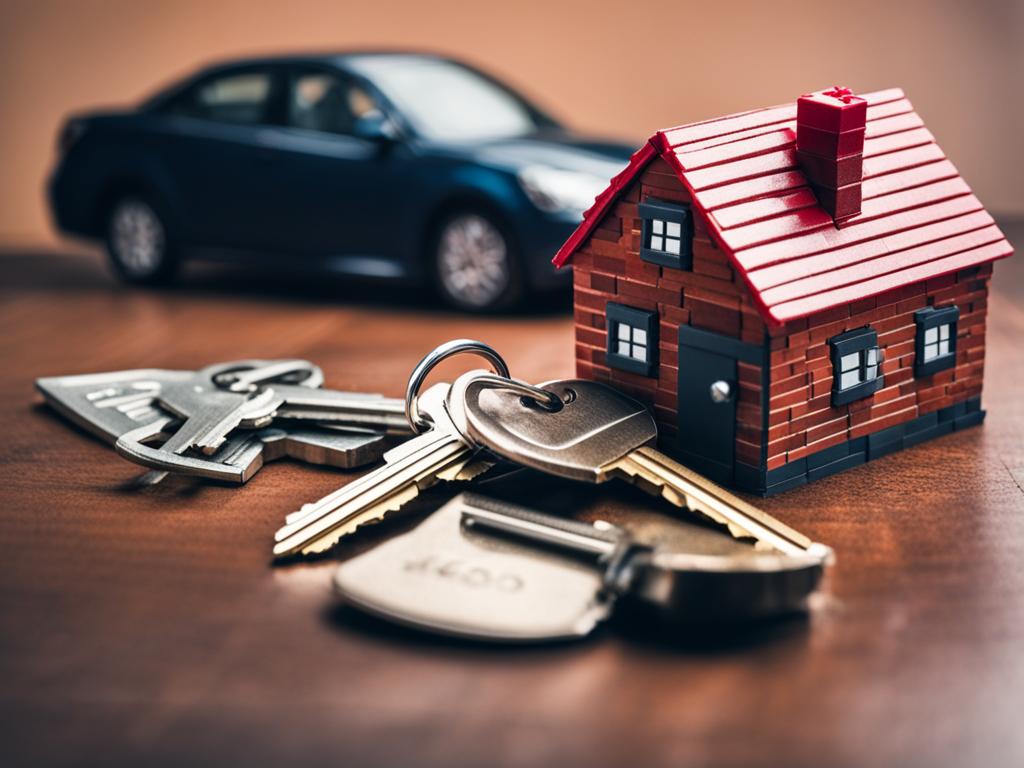
“To protect your assets, including your home, it’s important to ensure that your liability coverage matches your net worth.”
Implementing these measures can help you secure your assets, minimize the risk of property loss, and protect your home in the aftermath of an at-fault car accident.
| Protecting Assets after an At-Fault Car Accident | |
|---|---|
| 1. | Review and adjust liability coverage |
| 2. | Explore umbrella insurance |
| 3. | Familiarize yourself with homestead laws |
Steps to Take After an At-Fault Car Accident
Experiencing a car accident can be a stressful and overwhelming situation. After an at-fault car accident, it is crucial to take immediate action to protect your interests and minimize the consequences on your homeownership and property loss. Follow these important steps:
1. Call the Police
Immediately contact the police to report the accident, especially if there are injuries or significant property damage. Their presence at the scene ensures an accurate documentation of the accident and helps establish liability.
2. Exchange Information
Exchange contact and insurance information with the other parties involved in the accident. This includes names, phone numbers, addresses, insurance policy numbers, and vehicle details. It is important to gather as much information as possible to facilitate the claims process.
3. Report the Accident to Your Insurance Company
Notify your insurance company about the accident as soon as possible. Provide them with accurate and detailed information regarding the incident, including the date, time, location, and a description of the accident. Prompt reporting helps initiate the claims process and ensures timely assistance.
4. Seek Legal Advice from a Car Accident Attorney
Consulting with a car accident attorney is essential to protect your rights, navigate the legal complexities, and maximize your chances of obtaining a fair settlement. An experienced attorney can guide you through the claims process, negotiate with insurance companies, and represent your interests if the matter goes to court.
It’s crucial to remember that the steps you take immediately after a car accident can significantly impact your ability to recover compensation and protect your homeownership. Seeking legal advice and representation is highly recommended to ensure you receive fair treatment and accomplish the best possible outcome.
By following these steps, you can effectively address the aftermath of an at-fault car accident and protect your homeownership and property. Taking prompt action, reporting the accident to your insurance company, and seeking legal advice will help you navigate the complex process with confidence and minimize the potential financial impact on your assets.
Potential Risks to Homeownership in California
In California, if you are at fault in a car accident, your auto insurance policy should cover injury claims filed by other drivers. However, it’s important to note that your insurance may not fully cover the injured victim’s medical and repair costs, which can put your assets, including your house, at risk.
Liability for property damage in car accidents can have significant financial implications. If the damages exceed your insurance coverage, you may be personally liable for the remaining amount. This means that if you are found at fault for an accident and the damages exceed your coverage limit, you could be responsible for paying the difference out of your own pocket. This potential liability can extend to your personal assets, including your home.
Liability for property damage in car accidents can have significant financial implications. If the damages exceed your insurance coverage, you may be personally liable for the remaining amount.”
To protect your homeownership and financial well-being in California, it’s crucial to ensure that your liability coverage adequately matches your net worth. It may also be beneficial to consider purchasing an umbrella policy, which provides additional liability coverage beyond the limits of your standard auto insurance policy. By increasing your coverage, you can minimize the risk of personal liability and protect your assets, including your house.
In addition to insurance considerations, it’s important to be aware of California’s homestead laws, which protect a portion of your home equity from creditors. These laws can help safeguard your home in the event of a lawsuit resulting from an at-fault car accident. Consulting with a car accident attorney who is knowledgeable about California laws can provide valuable guidance on protecting your assets and understanding your rights.
It’s crucial to be proactive in managing the potential risks to homeownership in California. By taking appropriate steps to ensure sufficient insurance coverage, understanding homestead laws, and seeking legal advice, you can protect your home and financial stability in the aftermath of an at-fault car accident.
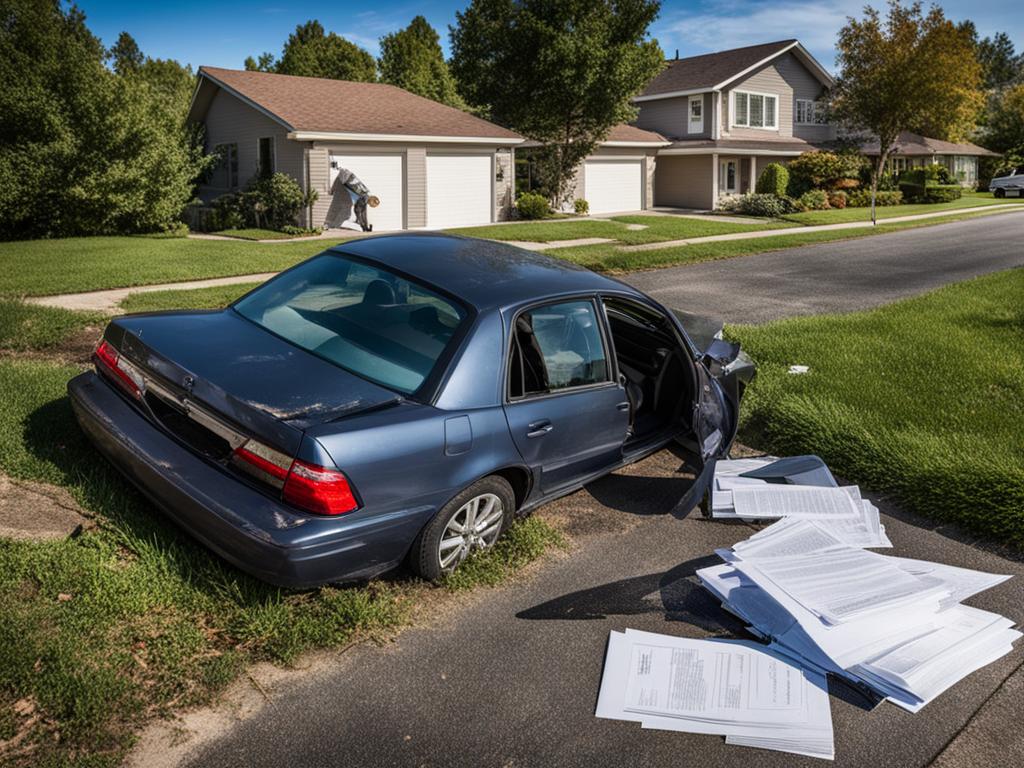
| Risks to Homeownership in California | Measures to Protect Your Assets |
|---|---|
| Inadequate insurance coverage | Review and increase your liability coverage |
| Exceeding insurance limits | Consider purchasing an umbrella policy |
| Personal liability for damages | Consult with a car accident attorney |
| Understanding homestead laws | Be aware of California’s homestead laws |
Protecting Your Financial Assets in California
When it comes to protecting your financial assets after an at-fault car accident, it’s crucial to be proactive and informed. Understanding your insurance policy’s limits and considering additional coverage options can help safeguard your hard-earned assets, including your home. In California, in particular, it’s important to be aware of the state’s homestead exemption laws that offer certain protections for homeowners.
One key step in protecting your financial assets is knowing the limits of your insurance policy. While liability coverage is required in California, it may not be sufficient to cover all the damages in a car accident. To ensure adequate protection, consider purchasing an umbrella policy, which provides additional coverage beyond the limits of your primary insurance policy. This extra layer of protection can potentially save you from significant financial loss if the damages exceed your liability coverage.
Another aspect to consider is the homestead exemption laws in California. These laws exist to safeguard a portion of your home equity from creditors in case of financial challenges, such as a car accident lawsuit that results in property loss. Understanding how these laws protect your home can provide you with peace of mind and added security.
Benefits of an Umbrella Policy
An umbrella policy offers several advantages for protecting your financial assets after an at-fault car accident. Here are some key benefits:
- Increased liability coverage: An umbrella policy supplements the liability coverage provided by your primary auto insurance policy, giving you higher limits of protection.
- Multiple coverage types: In addition to covering liability in car accidents, an umbrella policy may offer protection for other areas, such as personal injury, property damage, or even legal defense costs.
- Coverage for legal expenses: If you’re sued after an at-fault car accident, an umbrella policy may help cover the legal costs associated with defending yourself.
It’s important to consult with your insurance provider or a licensed insurance agent to determine the coverage options available to you and how an umbrella policy can fit into your overall asset protection strategy.
Homestead Exemption Laws in California
California’s homestead exemption laws provide certain protections for homeowners facing creditor claims. These laws allow you to designate a portion of your home equity as exempt from creditors, ensuring that some level of equity remains protected even in the event of a car accident lawsuit with property loss.
While the specific details may vary, the homestead exemption in California typically protects a certain amount of equity based on your age, marital status, and other factors. It’s important to understand the limitations and requirements of these laws to maximize the protection they offer.
Consulting with a knowledgeable attorney can provide you with the guidance and expertise needed to navigate California’s homestead exemption laws and ensure that your home is protected to the fullest extent possible.
| Steps to Protect Your Financial Assets in California |
|---|
| 1. Review your auto insurance policy and understand your liability coverage limits. |
| 2. Consider purchasing an umbrella policy to provide additional coverage beyond liability limits. |
| 3. Familiarize yourself with California’s homestead exemption laws and how they protect your home equity from creditors. |
| 4. Consult with an insurance agent to explore your coverage options and determine the best strategy for protecting your financial assets. |
| 5. Seek legal advice from an attorney specializing in car accident cases to ensure you have a comprehensive asset protection plan in place. |
Costs and Expenses After an At-Fault Car Accident
Being involved in an at-fault car accident can have significant financial consequences, potentially impacting your ability to meet various expenses. Here are some costs and expenses you may face:
- Medical Bills: Depending on the severity of the accident, you may require medical treatment, which can result in hefty medical bills.
- Vehicle Repair or Replacement: If your car sustains damage in the accident, you may need to pay for repairs or even replace the vehicle entirely.
- Household Expenses: If your injuries prevent you from caring for your children or require outside assistance, you may incur additional household expenses.
These costs can add up quickly and place a strain on your finances, potentially impacting your homeownership. It’s essential to be prepared and understand your options for managing these expenses.
“The financial burden of an at-fault car accident can be overwhelming, especially if you have limited resources. It’s crucial to explore all avenues for compensation and seek legal advice to protect your financial well-being.”
Seeking compensation through insurance claims, pursuing legal action against the at-fault party, or negotiating a settlement can help mitigate the financial impact. It’s crucial to consult with a car accident attorney who can guide you through the process and ensure your rights are protected.
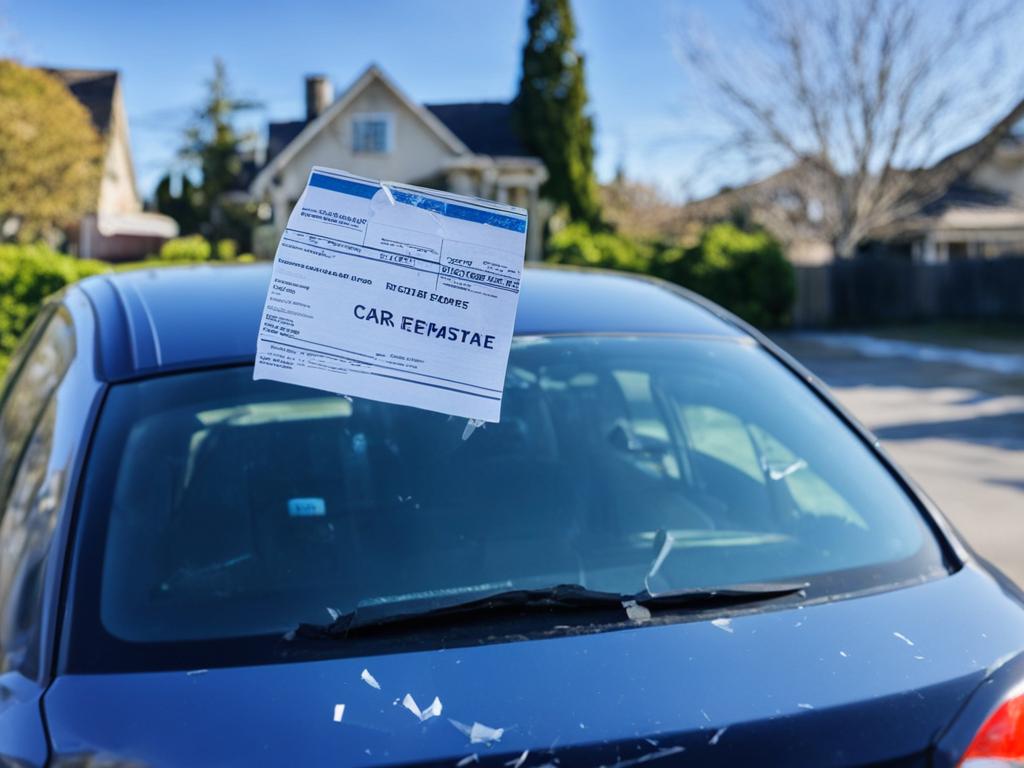
| Cost Item | Average Expense |
|---|---|
| Medical Bills | $10,000 – $50,000 |
| Vehicle Repair or Replacement | $3,000 – $10,000 |
| Household Expenses | $500 – $2,000 per month |
These costs are estimates and can vary depending on various factors such as the severity of the accident, the extent of injuries, and the region where you reside. It’s essential to keep accurate records of all expenses related to the accident and consult with a professional to ensure you are fairly compensated.
Legal Implications and Financial Risks in Miami, Florida
In Miami, Florida, at-fault drivers can face significant legal and financial consequences if they are sued for damages resulting from a car accident. While Florida law does offer some protection to homeowners, it’s crucial to understand the specific implications and risks involved. Consulting with a car accident attorney can provide valuable guidance in navigating these complexities.
Florida law recognizes that homeowners have a right to protect their homes from certain creditors. Under the state’s homestead laws, homeowners may be eligible for exemptions that safeguard their primary residence from being seized to satisfy certain debts. However, it’s important to note that these protections have limitations and may not apply in every situation.
“A car accident can have far-reaching consequences, and homeowners need to be aware of the potential financial risks they may face. By seeking legal advice, individuals can gain a better understanding of their rights and how to protect their homes.”
In cases where the damages resulting from an at-fault car accident exceed the liability coverage provided by the driver’s insurance policy, the at-fault driver can be held personally liable for the remaining balance. This means that if the damages awarded in a lawsuit exceed the amount covered by insurance, the at-fault driver may have to use their personal assets, including their home, to satisfy the judgment.
To protect their homes and financial well-being, at-fault drivers in Miami, Florida should consider the following measures:
- Reviewing their insurance coverage to ensure it adequately protects their assets and considering purchasing additional coverage, such as an umbrella policy.
- Understanding and complying with Florida’s homestead exemption laws, which can provide some level of protection to homeowners.
- Seeking legal advice from a car accident attorney who can assess the individual circumstances and offer personalized guidance on protecting assets.
By taking these steps, at-fault drivers in Miami, Florida can mitigate the risk of losing their homes due to an at-fault car accident and navigate the legal landscape more effectively.
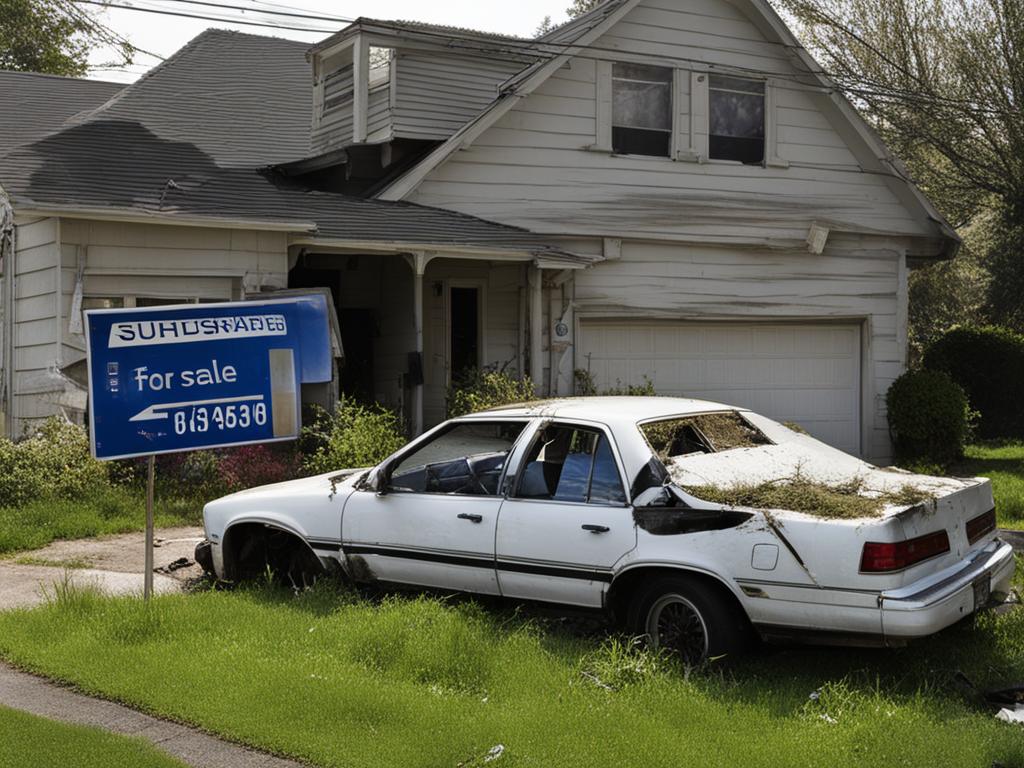
Steps to Take After a Car Accident in Florida
If you find yourself involved in a car accident in Florida, it’s crucial to take the following steps to protect your interests and ensure a smooth claims process.
- Remain at the scene: It’s essential to stay at the accident scene until law enforcement arrives and completes the necessary procedures.
- Call the police: Contact the police immediately and report the accident, providing them with accurate information about the incident.
- Check for injuries: Always prioritize the well-being of all involved parties and seek medical attention for anyone who requires it.
- Gather information: Collect important details from the other drivers involved, including their names, contact information, license plate numbers, and insurance information.
- Document the accident: Take photographs or videos of the accident scene, capturing any visible damages to the vehicles and the surrounding area.
- Report to your insurance company: Notify your insurance provider as soon as possible and provide them with all the relevant information about the accident.
Understanding Florida’s No-Fault Insurance System
It’s important to note that Florida follows a no-fault insurance system. This means that regardless of who is at fault, drivers are required to seek compensation for medical expenses and property damage from their own insurance company, up to the limits of their policy.
However, it’s still advisable to gather as much information as possible from the accident scene to facilitate the claims process and protect your rights.
In the unfortunate event of a car accident in Florida, following these steps will not only help protect your rights but also ensure a smoother resolution to your car accident claims and minimize any potential property loss.
| Steps to Take After a Car Accident in Florida | Benefits |
|---|---|
| Remain at the scene | Complying with legal obligations and avoiding penalties |
| Call the police | Providing an official record of the accident |
| Check for injuries | Prioritizing the health and well-being of all parties involved |
| Gather information | Ensuring accurate communication with insurance companies and facilitating claims |
| Document the accident | Providing visual evidence of damages and supporting your claim |
| Report to your insurance company | Initiating the claims process and starting the resolution of the accident |
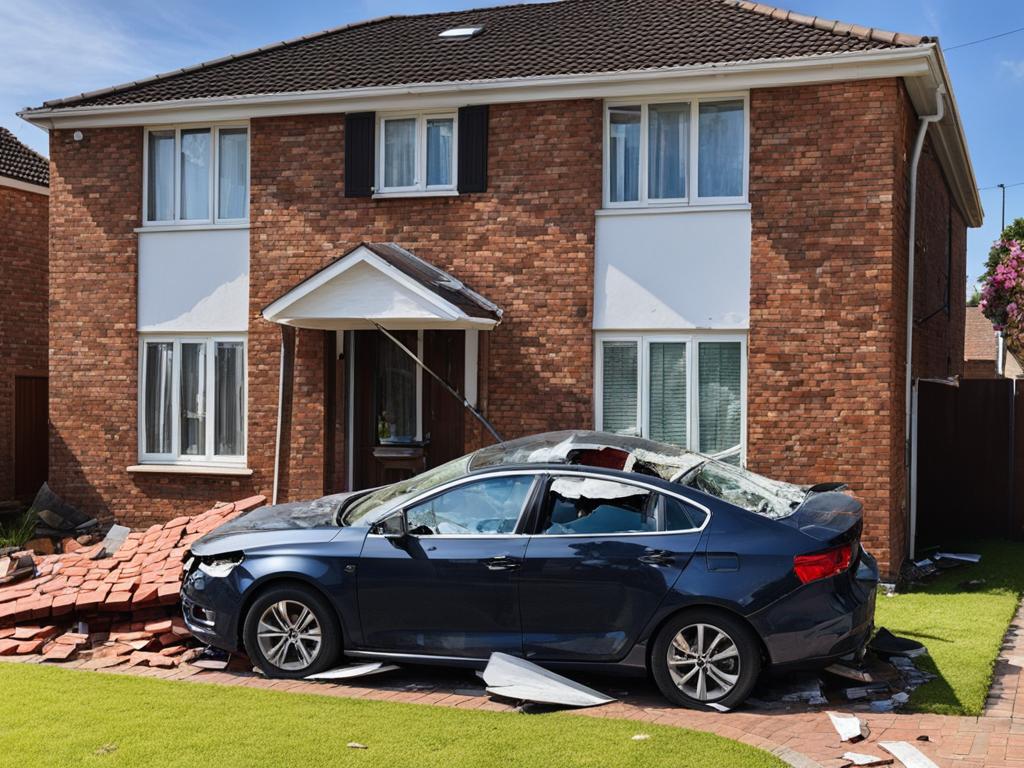
Asset Protection Strategies in Florida
When it comes to protecting your assets after an at-fault car accident in Florida, there are several crucial steps you can take to safeguard your financial well-being. By implementing these asset protection strategies, you can minimize the legal implications on homeownership and ensure the security of your valuable possessions.
1. Personal Injury Protection (PIP) Insurance
One effective way to protect your assets is to ensure you have sufficient personal injury protection (PIP) insurance coverage. PIP insurance is mandatory in Florida and provides coverage for your medical expenses, lost wages, and other accident-related costs, regardless of who is at fault. By having adequate PIP insurance, you can mitigate the financial burden and protect your assets from being exposed in a personal injury lawsuit.
2. Consult with a Car Accident Attorney
Seeking legal advice from a reputable car accident attorney is crucial in understanding the legal implications of at-fault car accidents on homeownership. An experienced attorney can guide you through the legal process, protect your rights, and help you make informed decisions to safeguard your assets. They can also negotiate with insurance companies and handle any potential lawsuits, ensuring your best interests are represented.
3. Understanding Comparative Fault Laws
Florida follows a comparative fault system, meaning that liability can be divided among multiple parties based on their degree of fault. Understanding comparative fault laws can help protect your assets by ensuring that any compensation you may be entitled to is not reduced due to shared liability. An attorney can evaluate the circumstances of the accident and determine the impact of comparative fault on your case.
4. Review your Liability Insurance Policy
Reviewing and understanding your liability insurance policy is essential for protecting your assets after an at-fault car accident. Ensure that your policy adequately covers your potential financial exposure, including property damage and personal injury claims. If necessary, consider increasing your liability coverage or purchasing an umbrella policy for additional protection.
| Asset Protection Strategies in Florida | Benefits |
|---|---|
| Personal Injury Protection (PIP) Insurance | Protects you from financial burdens by covering medical expenses and lost wages |
| Consult with a Car Accident Attorney | Provides professional guidance and representation to protect your rights and assets |
| Understanding Comparative Fault Laws | Ensures fair distribution of liability and potential compensation |
| Review your Liability Insurance Policy | Ensures adequate coverage to protect against potential financial risks |
By implementing these asset protection strategies in Florida, you can mitigate the legal implications of an at-fault car accident and safeguard your assets. Remember to consult with a car accident attorney who can provide personalized advice and guidance tailored to your specific situation.
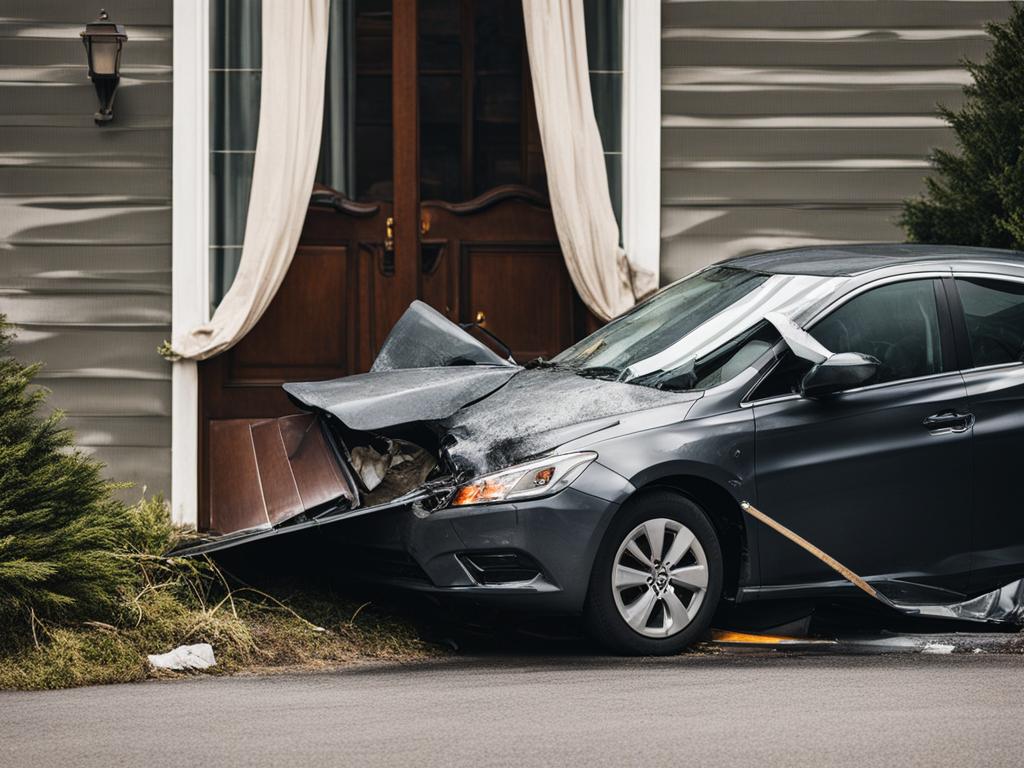
Limits to Damages in Car Accident Lawsuits in Florida
When it comes to car accident lawsuits in Florida, understanding the limits to damages is crucial. While there are no caps on economic and non-economic damages that can be sought, punitive damages are subject to certain limitations.
Under Florida law, punitive damages are capped at $500,000 or three times the amount of economic and non-economic damages, whichever is higher.
“It’s important for car accident victims in Florida to be aware of the limitations placed on punitive damages,” advises John Smith, a renowned car accident attorney. “These limits are put in place to maintain fairness and prevent excessive financial burdens on defendants.”
Punitive damages are awarded in cases where the defendant’s conduct is deemed to be especially reckless or intentional. They are intended to punish the defendant and deter similar behavior in the future.
However, economic and non-economic damages do not have any specific limitations in Florida. This means that accident victims can seek full compensation for their medical expenses, property damage, pain and suffering, and other related losses.
It’s important to note that determining the appropriate amount of damages in a car accident lawsuit can be complex. Factors such as the severity of the injuries, the impact on the victim’s life, and the available insurance coverage all come into play.
If you find yourself involved in a car accident lawsuit in Florida, it is crucial to work with a knowledgeable car accident attorney who can guide you through the legal process and help you pursue fair compensation.
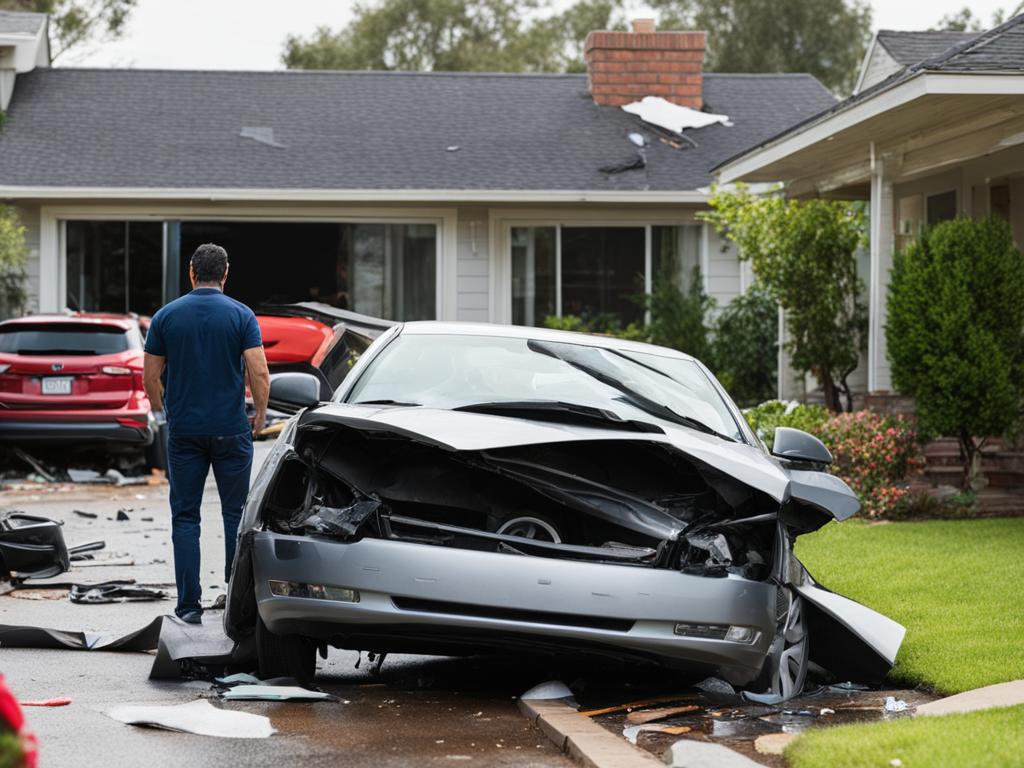
| Damages | Limits |
|---|---|
| Economic Damages | No Limit |
| Non-Economic Damages | No Limit |
| Punitive Damages | Up to $500,000 or three times economic and non-economic damages, whichever is higher |
Personal Liability and Potential Lawsuits
If you find yourself at fault for a car accident in Florida, it’s important to understand the potential personal liability and the risk of facing lawsuits for damages. While insurance coverage is designed to protect you in such situations, it may not always cover the full amount awarded in a judgment.
If your insurance settlement falls short of the judgment amount, you may become personally liable for the remaining balance. This means that your assets, including your home, could be at risk and subject to seizure in order to satisfy the judgment.
Protecting your assets after an at-fault car accident requires careful consideration and planning. It’s crucial to ensure that your insurance coverage adequately protects your financial well-being. Additionally, consulting with a car accident attorney can provide you with valuable guidance and help navigate the complexities of potential lawsuits.
“If you are at fault for a car accident in Florida, you can be sued for damages.”
By taking proactive steps to protect your assets and seeking legal assistance, you can minimize your financial responsibility and mitigate the risks associated with potential lawsuits.
Understanding Financial Responsibility for Property Damage in Car Accidents
The financial responsibility for property damage in car accidents falls on the at-fault driver. This means that if you are deemed responsible for the accident, you may be held liable for the costs of repairing or replacing the damaged property.
While insurance coverage is intended to provide financial protection, the extent of coverage and its limitations should be carefully reviewed. It’s important to understand the terms and conditions of your policy to ensure that you have adequate protection in the event of an at-fault car accident.
In addition, exploring options such as umbrella policies can provide an extra layer of protection beyond the limits of your standard liability insurance. These policies offer increased coverage limits and broader protection, helping you safeguard your assets in the face of potential property damage claims.
| Protecting Your Assets | Insurance Coverage Considerations |
|---|---|
| 1. Review your liability coverage | 1. Understand the extent of your coverage |
| 2. Consider purchasing an umbrella policy | 2. Explore options for additional coverage |
| 3. Consult with a car accident attorney | 3. Seek legal advice to ensure comprehensive protection |

By implementing these protective measures and seeking professional guidance, you can safeguard your assets and minimize the financial impact of at-fault car accidents and potential lawsuits. Remember, taking proactive steps is crucial to protecting your home and financial well-being in the aftermath of an accident.
Importance of Legal Assistance in Car Accident Cases
When it comes to navigating the complexities of car accident cases and protecting your legal rights, seeking the assistance of a car accident attorney is crucial. Not only can they provide you with expert guidance and representation, but they can also help minimize the financial risks associated with at-fault car accidents.
Car accident claims often involve significant property loss and can have serious legal implications on homeowners. With their in-depth knowledge of personal injury laws and car accident regulations, a car accident attorney can help ensure that your rights are protected and that you receive fair compensation for any damages incurred.
From negotiating with insurance companies to representing you in court, a skilled attorney can guide you through the entire legal process. They will work diligently to gather evidence, assess liability, and build a strong case to support your claim. By having an experienced professional by your side, you can increase your chances of a favorable outcome.
A car accident attorney has the expertise to navigate the legal system and ensure that your rights are protected throughout the entire claims process.
Furthermore, a car accident attorney can help you understand the intricacies of car accident laws specific to your state or jurisdiction. Each location may have its own regulations and statutes that can impact your case and potential compensation. By having an attorney who is well-versed in the local laws, you can ensure that you are following the necessary procedures and avoiding any potential pitfalls.
Considering the potential financial risks and legal consequences involved in at-fault car accidents on homeowners, it’s essential to consult with a car accident attorney as soon as possible after an incident. They will assess the circumstances of your case, provide personalized advice, and guide you through the entire claims process to protect your legal rights and interests.
Benefits of Seeking Legal Assistance
- Expert guidance and representation throughout the claims process
- Fair assessment of liability and determination of compensation
- Negotiation with insurance companies for a fair settlement
- Collection of necessary evidence to support your claim
- Knowledge of specific state laws and regulations
- Protection of your legal rights and interests
Protecting Your Assets – Consultation with a Car Accident Attorney
When it comes to the legal implications of an at-fault car accident on homeowners, consulting with a car accident attorney is crucial. Not only can they provide personalized advice and guidance, but they can also assist you in protecting your assets and understanding your rights in these complex situations.
One of the key advantages of seeking legal assistance is that an experienced car accident attorney can navigate the intricacies of insurance claims and potential lawsuits on your behalf. They have the knowledge and expertise to assess the situation, evaluate your liabilities, and determine the best course of action to protect your assets, including your home.
During a consultation with a car accident attorney, they will review the specifics of your case and provide you with a clear understanding of the legal implications you may face as a homeowner. They can offer insights into the potential financial risks and discuss strategies to minimize them.
Why Consult with a Car Accident Attorney?
- Obtain personalized advice and guidance
- Protect your assets and minimize financial risks
- Understand your rights as a homeowner
- Navigate insurance claims and potential lawsuits
- Evaluate liabilities and develop effective strategies
“Consulting with a car accident attorney can provide invaluable support in safeguarding your assets and securing your financial well-being after an at-fault car accident.”
By engaging a car accident attorney, you have an expert on your side who can negotiate with insurance companies, advocate for your rights, and represent your best interests. They can help you explore all available legal options, such as filing a counterclaim or seeking settlement agreements, to protect your home and other valuable assets.
In addition, a car accident attorney can also assist you in understanding the insurance coverage you have and its relevance to your homeownership. They can guide you on whether you have appropriate liability coverage and advise you on any additional steps you may need to take to ensure adequate protection.
Overall, seeking a consultation with a car accident attorney is an essential step in protecting your assets and navigating the legal implications of an at-fault car accident as a homeowner. Their expertise and understanding of the law can provide you with peace of mind, enabling you to focus on recovering from the accident while knowing your interests are being represented.
Your Path to Protection
To protect your assets and safeguard your homeownership after an at-fault car accident, follow these steps:
- Seek a consultation with a car accident attorney
- Discuss the specifics of your case and any legal implications
- Follow their advice on insurance claims and potential lawsuits
- Stay informed about your rights and liabilities as a homeowner
- Take necessary actions to mitigate financial risks
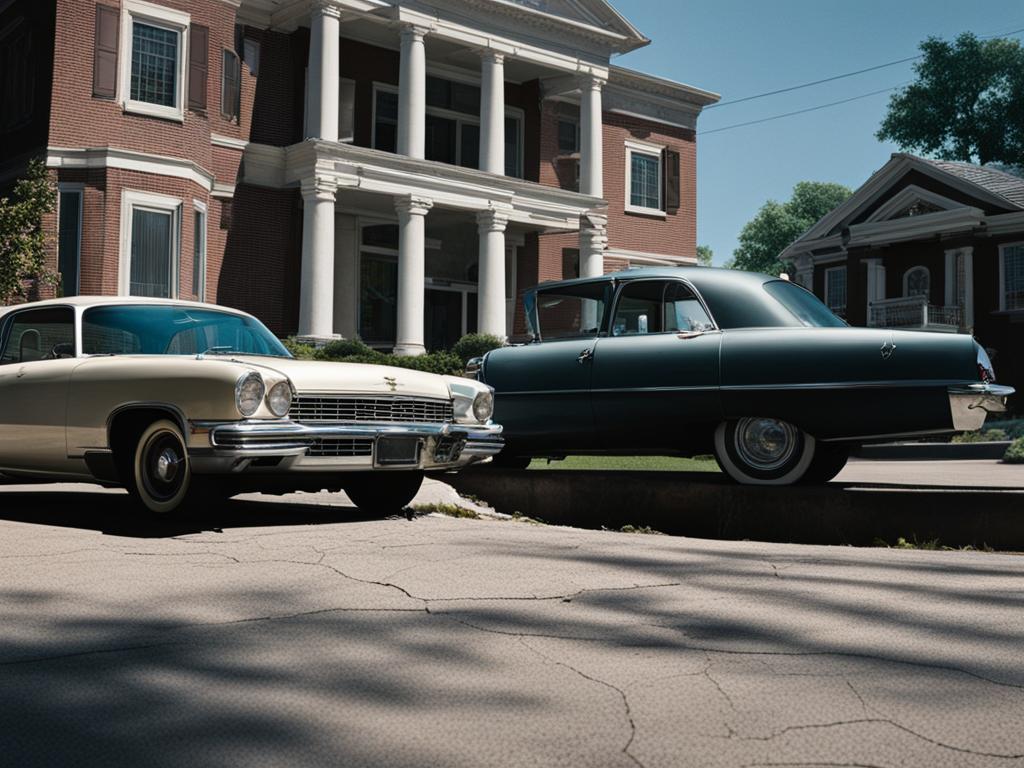
| Benefits of Consulting with a Car Accident Attorney | Protect Your Assets and Minimize Financial Risks |
|---|---|
| Obtain personalized advice and guidance | Ensure your assets, including your home, are adequately protected |
| Understand your rights as a homeowner | Maximize your chances of a favorable outcome in potential lawsuits |
| Navigate insurance claims and potential lawsuits | Develop effective strategies to defend your assets |
| Evaluate liabilities and develop effective strategies | Receive professional representation and advocacy |
Conclusion
After an at-fault car accident, protecting your assets, including your home, becomes paramount. To mitigate the risk of losing your house, it is essential to thoroughly understand your insurance coverage and its limitations. Consider adding an umbrella policy to provide additional protection in case the damages exceed your liability coverage.
Consulting with a knowledgeable car accident attorney is crucial in navigating the legal complexities and ensuring your rights are protected. They can guide you through the claims process and help you make informed decisions to safeguard your home and financial well-being.
Remember, taking proactive steps such as maintaining adequate insurance coverage, documenting the accident accurately, and seeking legal advice can significantly reduce the potential impact of an at-fault car accident on your assets. By being prepared and informed, you can protect what matters most.
FAQ
Can I lose my house due to an at-fault car accident?
It is possible to lose your house if you are sued for damages, found at fault for the accident, and the damages exceed the value of your home.
What does liability insurance cover in a car accident?
Liability insurance covers the costs of the other party’s injuries and property damage if you are at fault in an accident. However, if the damages exceed your liability coverage, you may be personally liable for the remaining amount.
How can I protect my assets after an at-fault car accident?
To protect your assets, including your home, it’s important to ensure that your liability coverage matches your net worth. Consider purchasing an umbrella policy for additional protection. Some states have homestead laws that protect a portion of your home equity from creditors.
What steps should I take after an at-fault car accident?
After an at-fault car accident, it’s crucial to call the police, exchange information with the other parties involved, report the accident to your insurance company, and seek legal advice from a car accident attorney.
What are the potential risks to homeownership in California after a car accident?
In California, your auto insurance policy should cover injury claims filed by other drivers if you are at fault. However, your insurance may not fully cover the injured victim’s medical and repair costs, potentially putting your assets, including your house, at risk.
How can I protect my financial assets in California after an at-fault car accident?
To protect your financial assets in California, it’s essential to know your insurance policy’s limits and consider purchasing an umbrella policy for additional coverage. Additionally, understanding the state’s homestead exemption laws can help protect your home from creditors.
What are the costs and expenses after an at-fault car accident?
After an at-fault car accident, you may face various expenses, including medical bills, vehicle repair or replacement costs, and household expenses if you are unable to care for your children during recovery.
What are the legal implications and financial risks in Miami, Florida after an at-fault car accident?
In Miami, Florida, at-fault drivers can be sued for damages resulting from a car accident. While Florida law protects homeowners to some extent, it’s important to consult with a car accident attorney to understand the specific implications and risks.
What steps should I take after a car accident in Florida?
In Florida, all drivers involved in an accident must remain at the scene, call the police, check for injuries, gather information from other drivers, and report the accident to their insurance company.
How can I protect my assets in Florida after an at-fault car accident?
In Florida, ensuring you have sufficient personal injury protection (PIP) insurance and consulting with a car accident attorney can help protect your assets. Understanding comparative fault laws and reviewing your liability insurance policy are also important steps to take.
What are the limits to damages in car accident lawsuits in Florida?
In Florida, there are no caps on economic and non-economic damages that can be sought in a car accident lawsuit. However, punitive damages are limited to $500,000 or three times the economic and non-economic damages, whichever is higher.
What is the personal liability and potential lawsuits after an at-fault car accident?
If you are at fault for a car accident in Florida, you can be sued for damages. If your insurance settlement does not cover the amount awarded in the judgment, you may be personally liable and could face the seizure of assets to satisfy the judgment.
Why is legal assistance important in car accident cases?
Seeking legal assistance from a car accident attorney is crucial in navigating the complexities of car accident cases, protecting your legal rights, and minimizing financial risks.
How can consulting with a car accident attorney protect my assets?
Consulting with a car accident attorney can provide personalized advice, assistance, and guidance in protecting your assets, understanding your rights, and navigating insurance claims and potential lawsuits.

